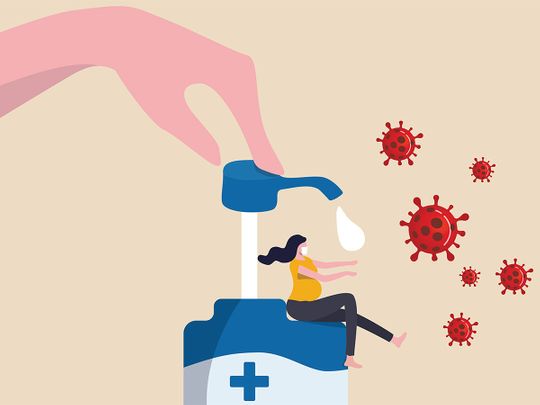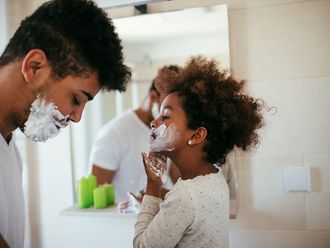
It’s been drummed into all of our heads by now: the best way to kill the new Coronavirus and prevent its spread during the pandemic is to wash our hands frequently with soap and water, or to use a hand sanitiser that contains at least 60% alcohol.
Sales of alcohol-based hand rubs (ABHRs) and related products have skyrocketed as a result, rising by more than 800% compared to last year’s figures in the US, while the increase in demand has led to rationing in some parts of the world and price hikes as manufacturers work to keep up with the surge in demand.
But as companies start pumping out new product at an unprecedented speed, the chemicals that such sanitisers contain have come under scrutiny, with Dubai Municipality recalling six different hand sanitiser brands for containing methanol, a type of alcohol that’s known to be highly toxic and hazardous to human health.
While approved alcohol-based hand rubs (ABHRs) do not contain methanol, their active ingredients are usually ethanol or isopropanol - potent alcohols that have been proven to be strong enough to kill the Coronavirus that causes Covid-19 when applied for more than 30 seconds.
But, while we may want them to be strong enough to kill the virus, are such powerful chemicals totally safe for pregnant women?
Could alcohol-based hand rubs (ABHRs) harm my growing baby?
In normal times, hand sanitisers are used so infrequently that you'd probably never seriously consider their potentially negative effects. But during this pandemic, use of alcohol-based hand rubs has become almost a nervous tic for many of us. “A pregnant woman may worry about the use of alcohol-based hand sanitisers, thinking that the alcohol can get absorbed through her skin and inhaled through her nose when using it,” says Dr Deemah Salem, Specialist in Obstetrics and Gynaecology at Genesis Healthcare Center in Dubai, “and we do know that ingestion of alcohol results in high levels of alcohol in the blood stream, which then crosses the placenta and causes teratogenic effects (harmful to fetal development)."
However, topical application of alcohol is very different from drinking it, says Dr Salem: “Absorption through the skin and inhalation through the nose are definitely not the same as ingesting it by drinking it and result in different blood alcohol levels.”
A 2011 study looked at whether frequent use of hand sanitiser could trigger a positive screen for alcohol use in certain types of tests and found that, in some cases, biomarkers for alcohol could be detected in the urine of the study participants (who had used hand sanitiser every five minutes for a 10-hour period for three days in a row). This is because many of the hand sanitisers contain ethyl alcohol, which is the same type of alcohol in alcoholic beverages, says Gary Reisfield, MD, an assistant professor in the department of psychiatry with the UF College of Medicine. “The body does not distinguish between drinking alcohol and handwash alcohol. Anyone out there who is required to abstain from alcohol needs to be very cognisant about alcohol that may be hidden in products such as handwashing gels, mouthwashes, hairsprays and cosmetics. You need to be careful not just what you put in your body but what you put on your body.”
However, the level of detectable alcohol is so low that it would not pose any risk to the health of a pregnant woman or her unborn child, says Genesis Clinic’s Dr Salem. “The limited studies that were done showed that the amount of alcohol absorbed through the skin as well as from inhalation resulted, at most, to blood alcohol levels comparable to drinking non-alcoholic beverages, which are extremely low levels. With this said, it is very unlikely that these small concentrations will cause teratogenicity for the developing fetus and using alcohol-based hand sanitisers are safe.”
This is supported by research announced in 2017, which was undertaken in response to the US Federal Drug Association’s (FDA) request for more data on the safety of alcohol rubs, and concluded that pregnant and breastfeeding healthcare workers are well within safe exposure limits and can use alcohol hand rubs without risk to foetus or baby. “The internal doses of ethanol associated with frequent use of hand sanitizers and scrubs are hundreds of times lower than the concentration that might be related to [reproductive] developmental effects,” said Andrew Maier, PhD, CIH, DABT, associate professor of environmental health at the University of Cincinnati. “That is good news. Based on this, there is no significant risk of developmental reproductive [effects] from repeated use of these types of materials. The exposure that one can get from using these products is way below the concentrations that cause these kinds of effects.”
Benefits versus risks
While some experts have pointed out that there is no established safety threshold for fetal alcohol syndrome, the benefits of pregnant women using alcohol hand rubs to safeguard against Coronavirus and other infections far outweigh this risk, and there is no need to limit the use of alcohol-based hand sanitisers, says Dr Salem: “Based on what we know, it is not advisable to limit the use of the alcohol based hand sanitisers by pregnant women. Doing so may actually cause more harm by increasing the chances of infection by having contaminated hands. And the consequences of infection in a pregnant mum can be detrimental. We would make the same recommendations to pregnant women as we would to the general public and that is that proper hand washing with soapy water for at least 20 seconds is key in prevention of the spread of the novel Coronavirus, and if soap and water are not available and the hands are not visibly soiled, an alcohol based hand sanitiser (containing at least 60% alcohol) is a safe and effective alternative.”
Careful handwashing with soap and warm water for at least 20 seconds is still the gold standard when it comes to best hand hygiene practice against the Coronavirus, according to the World Health Organisation, but this is because it is more effective at removing dirt, bacteria and viruses, not because of health concerns about alcohol-based sanitisers, says Dr Salem: “Soap and water remain to be preferable to hand sanitisers because hand sanitisers may not completely clean the hands when they are visibly dirty or greasy. Hand sanitisers are only used as a quick alternative if water and soap are not available.”
Nevertheless, ingesting alcohol hand rubs by mouth can cause alcohol poisoning, so it’s important to keep such products out of the reach of children and ensure they are monitored when using them.
It’s also worth noting that the research into the effectiveness of ABHRs against SARS-CoV-2 (the Coronavirus that causes Covid-19) found that they are able to inactivate the virus only when there was exposure for at least 30 seconds or more, so make sure you’re using them for the required amount of time.
Read more:








